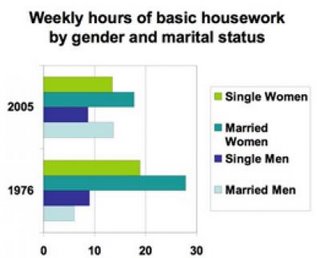Tuesday, April 08, 2008
An inefficiency of marriage?
 The Bureau of Labor Statistics has been dealing with budget cuts by cutting the time-use study it does. That will make it more difficult to do studies like this:
The Bureau of Labor Statistics has been dealing with budget cuts by cutting the time-use study it does. That will make it more difficult to do studies like this:Having a husband creates an extra seven hours a week of housework for women, according to a University of Michigan study of a nationally representative sample of U.S. families.Notice the picture above, which shows that all categories of work for women went down and for married men went way up. (For single men, up but only slightly.) That's likely a function of both the technology of housekeeping and because the cost of housekeeping went up because the marginal value of an hour of time rose. Additional labor force participation -- particularly for females -- would play a role.For men, the picture is very different: A wife saves men from about an hour of housework a week.
The math of this is a bit strange. Why do women work seven more hours on housekeeping but men work one less hour? It's absurd to think that's a gender difference in productivity (as flattering as that might be to us men) or a change in the costs. So is it a change in demand? When I mentioned this to my family, Littlest responded quickly "women care more about cleanliness than men, so men can slough off when married." But did women slough off before they got married? Why did the housekeeping cost of two people living in one home rise by six hours?
It would seem a signaling issue rather than a game theory story. Both men and women rise in the amount of housework done; do two people in one house make a bigger mess than two people in two homes? I guess I don't see that. So it would appear to me that each wants the other to know that they are neat. They invest in a signal that they are good mates. Given the sharp rise in the hours devoted by married males (with no significant change in the hours of single males) we would have to conclude that men are more interested in signaling than before.
Confounding this, of course, is the rise in relative wages for females, making their labor in housekeeping more expensive relative to males. But I still see a fair amount of signaling going on in this story. Is the signal a waste of people's time?
(h/t: The Corner)
Labels: economics









